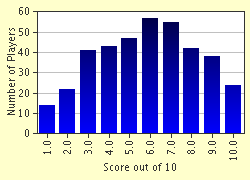Quiz Answer Key and Fun Facts
1. Albert Speer was born in 1905 and grew up during Germany's depression following the Treaty of Versailles. Largely unaffected by the nation's impoverished state due to the affluence of his family, Speer went to university and followed his fathers footsteps to become a professional in which field?
2. In the earlier years, Speer gained a reputation with senior party men like Hanke and Goebbels for 'getting things done.' Even Hitler took note and promoted him into the inner circle. Speer's 'cathedral of light' at a particular event escalated their relationship. What was this event?
3. In February 1942, Speer's world would change remarkably with Hitler's words; "Herr Speer, I appoint you successor in all his capacities." He was now in total control of all building and construction, armaments and munitions in Germany and the occupied territories. Who was Speer succeeding in this capacity?
4. When Speer met the young and enthusiastic team of scientists headed by Wernher von Braun at the Peenemunde Complex, he was captivated. Although Hitler ordered low priority development, Speer secretly ensured they received the resources required to continue their work. What 'secret weapon' were they designing?
5. An unusual alliance of Speer, Goebbels and Goering was formed to undermine the scheming and corruptive influence this man had on Hitler. He was jealous of the relationship Speer had with Hitler and also the power Speer had at his disposal. As head of the Reich's Gauleiters, he made life complicated for Speer. Who was this party leader?
6. April 1943, Speer proposed a committee of industrial specialists be established to determine the crucial targets in Soviet production. Instead of pointless area bombing they should target buildings and industrial plants crucial to the war effort. The proposal was rejected by Hitler. Four weeks later Speer would experience the effects of target bombing first hand, though not from the Luftwaffe but the British RAF when they attacked dams supplying electricity to Germany's industrial heartland on which river?
7. By 1944, Speer's war time production was achieving record output even though allied bombs were destroying factories. Post war analysis by allied experts have claimed his efforts prolonged the war between one and two years. Is it true that this result was largely achievable because he convinced Hitler to mobilise German women for the war effort?
8. Towards the end of the war Hitler issued a decree (on top of the existing scorched earth policy) stating "All military transport, and communications, facilities, industrial establishments and supply depots, as well as anything else of value within Reich territory, which could in any way be used by the enemy will be destroyed." In defiance, Speer refused to carry out this order and lobbied support from Field Marshalls and the more difficult Gauleiters. What was this decree titled?
9. In the final moments of the war the Russians had encircled Berlin and street fighting had begun. Artillery had already damaged the Chancellery. Is it true, that under these conditions Speer flew into the heart of Berlin to say his farewells to the Fuehrer in his bunker?
10. Speer was tried on all four charges at the famous Nuremburg trial. Conspiracy to wage war, crimes against peace, war crimes and crimes against humanity. He was found guilty of two of these indictments. What sentence did he receive?
Source: Author
Bertho
This quiz was reviewed by FunTrivia editor
bloomsby before going online.
Any errors found in FunTrivia content are routinely corrected through our feedback system.

